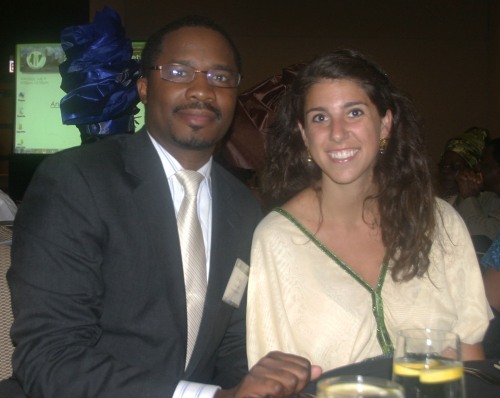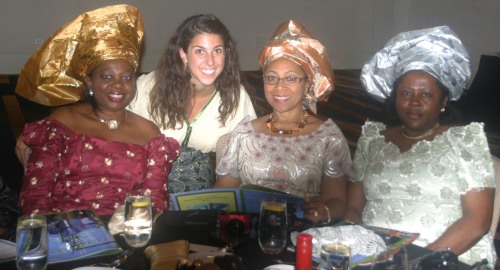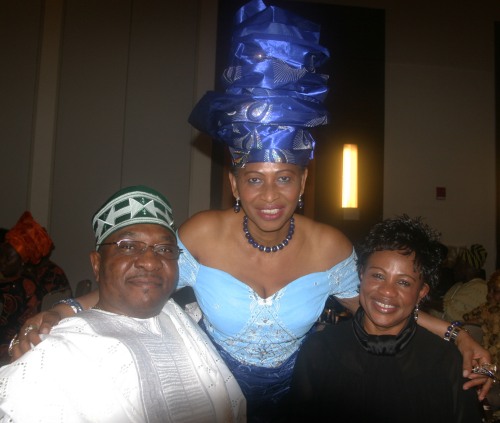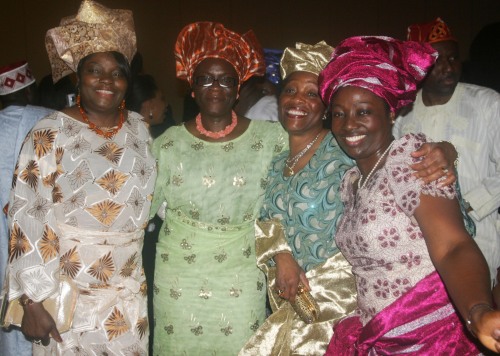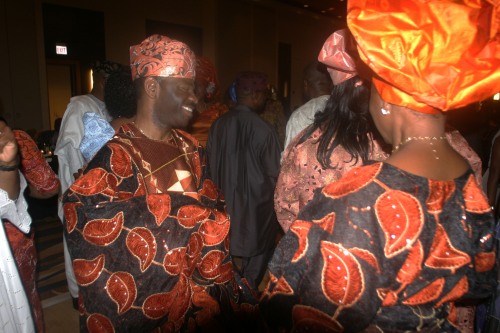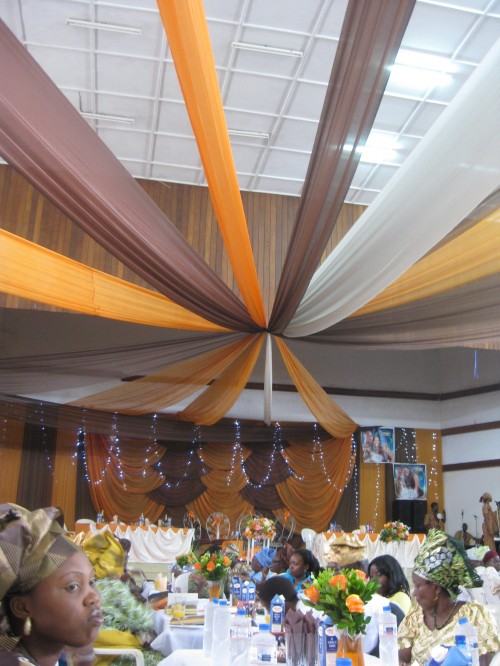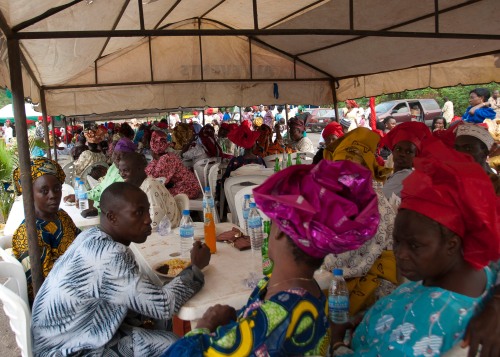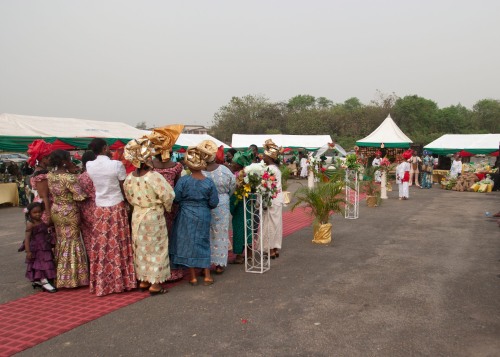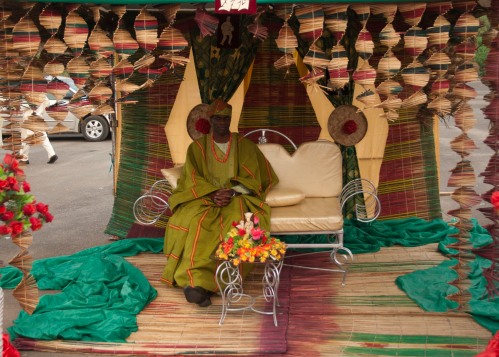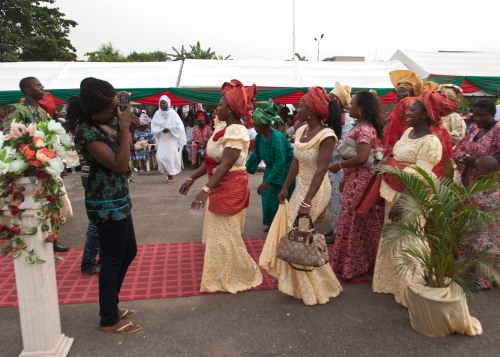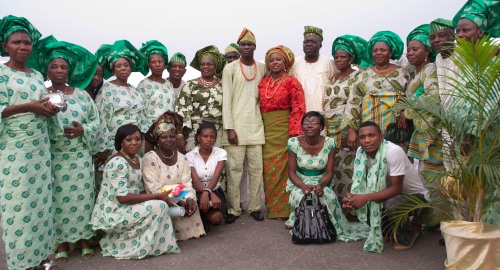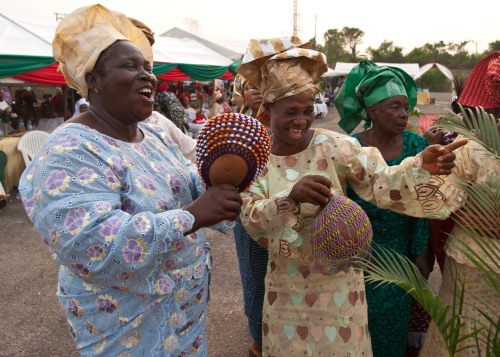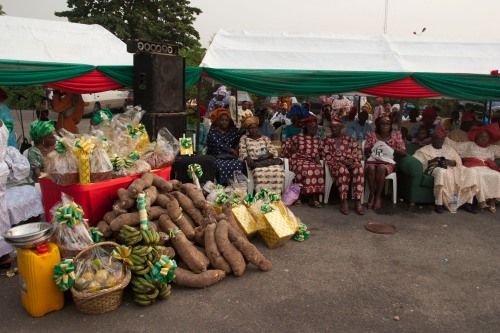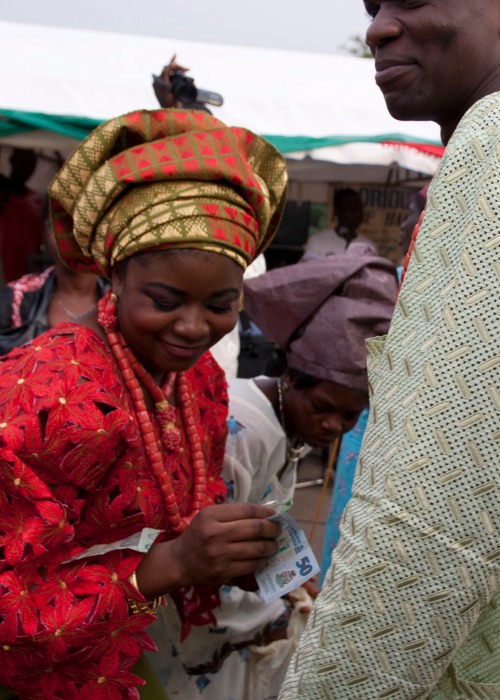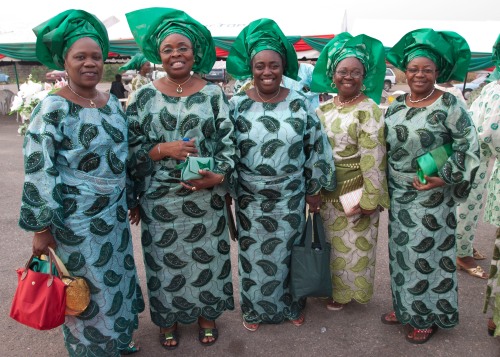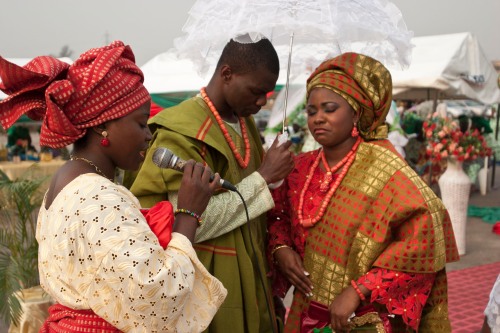We weren’t exactly sure why we were there. The five of us sat with straight faces and glassy eyes around the shiny conference table, listening to the voice of the CNN reporter discuss the implications the natural disaster in Japan will have on the electronics market. We were tired–Oyinbos dislike waking up at 5:30 a.m. All we knew was we had arrived at the girls’ college in Ikeja, Lagos to do some sort of speech that required us to wear Yoruba outfits. Finally a Madame entered, wearing a lovely collared shirt, black skirt and high-waisted belt-a stark contrast to our brightly colored long ankara outfits. She hugged each of us, told me she loved my latest video on YouTube and passed out the programs for the day. This woman turned out to be the director of Vivian Fowler, Mrs. Funke Amba. After that day, I now refer to her as Aunty Funke.

Yoruba Day at Vivian Fowler and we are the special guests.
Thursday, March 17, 2011 was deemed Yoruba Day at
Vivian Fowler Memorial College for Girls–a day for us, the Yoruba speaking Oyinbos, to plant a little seed of shame, amazement and most of all motivation in the hearts of ajebota secondary school children who don’t care to speak their native language. Yoruba Day started with giving us a tour of campus. Once you enter through the main gate, just past the hedge trimmed to spell V-i-v-i-a-n-F-o-w-l-e-r, you cast your eyes upon a impeccably kept courtyard with more impressive bush shapes–a horse, a man and woman are among the bush figures. The tour, led all in Yoruba on Yoruba Day of course, brought us to the fully stocked chemistry labs, home economics rooms, art gallery full of works of students’ art, a full court basketball court, and the peaceful, sparkling library with an impressive collection of worldly books. I was impressed. Students in tidy, well ironed light orange and blue uniforms greeted us politely in English as we roamed the campus. Any child would be lucky to go to a school like Vivian Fowler.
The program started like all Yoruba events, introducing the important guests. Among them were very important people in education in Lagos State, the King of Lagos’ chiefs, and us! We sat on couches on either side of the stage-boys on one side, girls on the other-covered in adire cloth and stood up to wave to the audience when they introduced each of us. We heard speeches from University of Ife Professor Wale Omole, one of the king’s chiefs and Mrs. F.O. Erogbogbo, the Permanent Secretary for the Ministry of Education in Lagos state. After a few interludes of Yoruba entertainment we heard speeches from students from each of the secondary schools present. When it was our turn to speak I was nervous, as usual. I wanted to make a comprehensive speech that not only impressed people, but also conveyed a serious message to the students about reviving their native language. I started by going down on my knees to greet everyone, a proper Yoruba greeting. I spoke about our experience in University of Ibadan and how we really shock people when they hear Yoruba come out of our mouths, but they still speak English back to us. I told them that they should use us Yoruba speaking white people as an ipenija, challenge. N ko fe ki oju ti won, mo fe fun won ni imisi lati ko Yoruba sii. I told them to watch Mainframe movies, listen to singers like Asa where they can hear ijinle Yoruba. They can also read books, but sometimes Yoruba books can be very difficult to get through (I’m reading ‘Alo Ijapa’ right now and it can be hard for me to fully understand at moments.) I think I spoke well for not having any time to prepare or practice. I left the stage feeling pleased, like I said something that might actually ignite a fire in some of the students’ hearts for the Yoruba language.
The event went smoothly, as to be expected from such a fine school like Vivian Fowler. Mrs. Funke Amba, the director of the school, organized event after seeing us in the Punch newspaper and saw that it did not fall victim to too much Africa time. They gave us beautiful cloth as gifts (adire for the girls and guinea for the boys). After the program we moved outside where we stood in one spot smiling for almost an hour while groups of students and adults filtered through and clicked obscene amounts of pictures. All the while, journalists and camera crews stood by desperately trying to interview us. I felt a little like an animal in a zoo, but it was all for a good cause. Right before we got in the car to leave, a young girl, she must have been no older than 12 ran up to me and asked, “can I hug you?” She wrapped her hands around my waist, pressed her head into my chest and gave me the tightest hug. Hopefully that’s a sign we got through to them.
This slideshow requires JavaScript.
Read Full Post »
